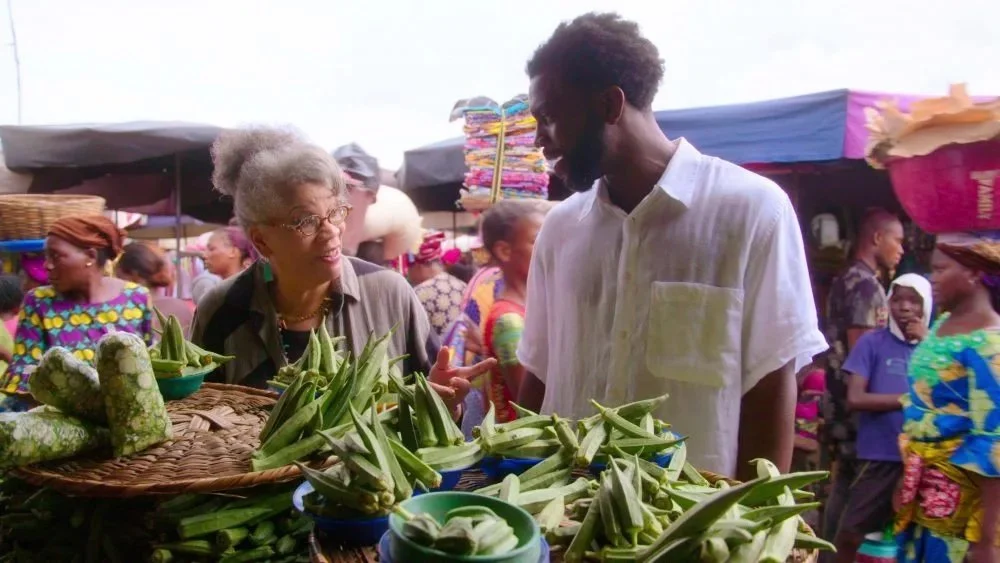Source Report: February
High on the Hog
Welcome to February, which is Black History Month! Last year we hosted a fun hang out at our HQ where our team watched the first of a four episode documentary, "High on the Hog", and learned about the deep history of how African-American cuisine transformed America. If you haven't seen it and are a lover of history and food, this is your sign to watch it! If you have and you are like me, then you can relate to how exciting it is to trace specific ingredients or dishes that have lasted the test of time to Black heritage. The foods they introduced and recipes made to nourish the soul feel good to cook, and especially to eat.
If you are looking for a historical deep dive into African-American cooking, "The Jemima Code" by Toni Tipton-Martin highlights over 150 cookbooks dating as far back as 1827, written by African-American cooks. Although there are a handful of recipes shared in this book, the author is uplifting the African-American roots and stories and showing us the impact they’ve had on American cooking, cultures and communities throughout decades. One of my favorite recipes is the "Oyster Gravy" that's made with salty bacon served over rice. So for this month, I encourage you all to lean into those food roots and get inspired to do some southern cooking!
Happy cows at Santa Carota!
NEWS & SEASONAL TRENDS
Have you ever wondered where we get our meat from? I can easily deep dive and nerd out on this stuff, so here's some info for your enjoyment. When it comes to beef, we use Brandt Beef for short ribs. The flank meat for our Taquiza's carne asada is from Marin Sun Farms. When we need to elevate and serve a nice piece of flat-iron, we source it from the ranch that feeds exclusively carrots to their cows. Yes, only carrots at Santa Carota. Fun fact, that is the same steak that is currently being served at an old favorite restaurant of mine known for delivering an unparalleled level of consistency with their cuisine and service, and a consistent happiness in my heart and belly, Gjelina!
Roasted Red Kuri Squash
On the produce front, we received some beautiful orange-skinned Red Kuri squash from Gloria Tamai Farms that we roasted up, pureed and put into a donut hole! Think pumpkin pie, but better! Polito Farms has some of the best citrus in Southern California and is in our neck of the woods, Valley Center. They've graced us with Oro Blanco, Ruby Red grapefruits, and the famous, short-seasoned Cara Cara oranges. Why are they called Cara Cara? It goes back to when they were discovered at the Hacienda Cara Cara in Venezuela in 1976. They’re essentially a navel orange hybrid, because they've been crossed with the Washington and Brazilian Bahia navel oranges. They have less acidity than most and a beautiful deep orange color. Last but not least, Tutti Frutti bringing us an exquisite array of squashes: Kabocha, Gold Bar, and Tetsukabuto. You probably think you don't know Tetsukabuto but you've seen it. It has a dark green and hard skin, reminiscent of an old iron helmet which is the Japanese translation for it. There is a fun and interesting story about Tutti Frutti's heirloom tomatoes and what Kevin and I witnessed at the Santa Monica Farmers Market, but I'll keep you in gripping suspense for now until the more seasonal appropriate summer update...
FARM WORTH READING ABOUT
Lastly, and this is a sneak peek of what's to come, it gives me enormous joy and pride to announce that we have embarked on the journey of making our own bread!!! We will be working with Anson Mills to accomplish this. You can thank our culinary visionary, Rocio, for insisting we use the best ingredients possible. They will be our purveyor of fresh native stone-ground organic ingredients milled from new crop heirloom grains, legumes, and oil seeds. They cold-mill all ingredients to order, immediately chill and vac-pac them, then ship them the same day for maximum flavor retention. We will be using the following grains and flour: Farina di Maccheroni will go into our handmade pasta. The 1800 Mediterranean bolted white bread flour is being applied to our bread program including brioche, miso buns, and focaccia. The Farro Piccolo aka the oldest grain on earth, Einkorn, was the first seed planted by the first farmers 12,000 years ago during the Neolithic Revolution- that's going into R&D'ing our new Fork & Knife dishes.
There you have it, lots of fun new developments in the works and more to share and experience in our new endeavors.





